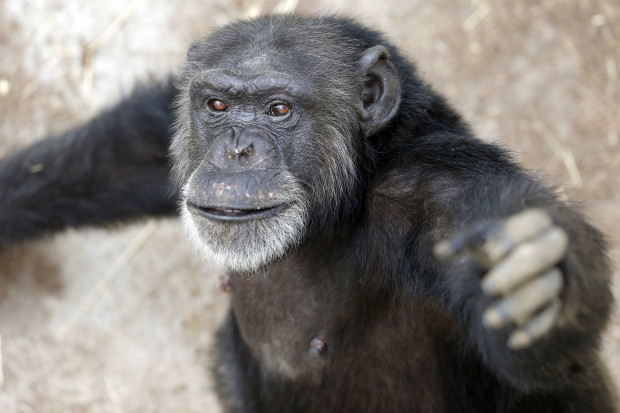The National Institutes of Health (NIH) has just released an official plan for the retirement to permanent sanctuary of the hundreds of government-owned and -supported chimpanzees, paving the way for the movement of these chimpanzees to commence in earnest. Back in November, after prior announcements that it was getting out of the business of using chimps in invasive experiments, the NIH announced it was abandoning plans to maintain a colony of 50 chimpanzees for possible use in research and would instead retire them all to sanctuary. The decision to end decades of invasive government-funded experiments on chimps came after expert deliberations that concluded with a declaration that chimpanzees are no longer necessary for biomedical research, given the development and recognition of alternative methods and approaches. The gate on invasive chimp experiments was closed and then locked in 2015 after the U.S. Fish and Wildlife Service (in response to an HSUS-led petition) listed captive chimpanzees as endangered under the Endangered Species Act, providing them the same level of protections as wild chimpanzees. Today’s announcement is a follow up to those momentous actions.
 Sabrina, pictured above, is a chimpanzee formerly retired from the NIH to Chimp Haven. With NIH’s announcement today, many more chimps will be joining her soon. Photo by Brandon Wade/AP Images for The HSUS
Sabrina, pictured above, is a chimpanzee formerly retired from the NIH to Chimp Haven. With NIH’s announcement today, many more chimps will be joining her soon. Photo by Brandon Wade/AP Images for The HSUS
According to the NIH’s plan, the first chimpanzees slated to be moved to Chimp Haven, the national chimpanzee sanctuary, will be those now at Alamogordo Primate Facility in New Mexico (approximately 140 chimpanzees). They will be followed by those held at MD Anderson’s Keeling Center in Texas (also currently 140 chimpanzees) and then, by around 80 chimpanzees at Texas Biomedical Research Center whose care has been supported by NIH. Chimp Haven has space for as many as 75 chimpanzees now and NIH has committed to start moving animals to sanctuary as soon as possible. Happily, the 19 government-owned chimpanzees who used to reside at Texas Biomed have already moved to Chimp Haven this past spring.
We are very grateful to Dr. Francis Collins, director of NIH, for his leadership on this issue and his dedication to get all government-owned chimpanzees retired. Unfortunately, but not surprisingly, a few in the animal research community do not want to see chimpanzees move to sanctuary and have fought this effort every step of the way—especially those with different types of vested interests in maintaining government-owned chimpanzees. Sadly, there have been recent attempts to keep the chimpanzees in laboratories by publicly attacking Chimp Haven’s reputation. You can see Chimp Haven’s response to these cynical and ridiculous attacks here.
Chimp Haven is one of the best chimpanzee sanctuaries in the world, is home to nearly 200 chimpanzees, and provides the highest welfare standards for government-owned chimps at a lower cost than laboratories. Chimp Haven often takes in chimpanzees who are elderly and in poor health after years as research subjects, and its leadership has done an amazing job providing these chimpanzees with comfort, enrichment, and top-flight care.
This plan from NIH is an important step, but the story doesn’t end there. In order to ensure the retirement of all 360 government-owned chimpanzees, Chimp Haven will need to expand significantly. Because not all of the government owned and supported chimpanzees can be moved by the end of the year, it will become important to work with the next administration to ensure the plan continues to move forward. Sanctuary is where these chimpanzees belong and the support of animal protection groups, the NIH, the public, and legislators will continue to be critical to see this effort through.
We do not intend to leave these animals on the battlefield. We’ve driven the campaign to get chimps out of animal research, we’ve driven the campaign to end their split-listing by the federal government, we’ve driven the conversation about their permanent and ultimate protection, and we won’t consider our job complete until they all find safe passage and public recognition for their sacrifice.
The post NIH announces plans for transfer of chimps from laboratories to sanctuaries appeared first on A Humane Nation.
Enviroshop is maintained by dedicated NetSys Interactive Inc. owners & employees who generously contribute their time to maintenance & editing, web design, custom programming, & website hosting for Enviroshop.
